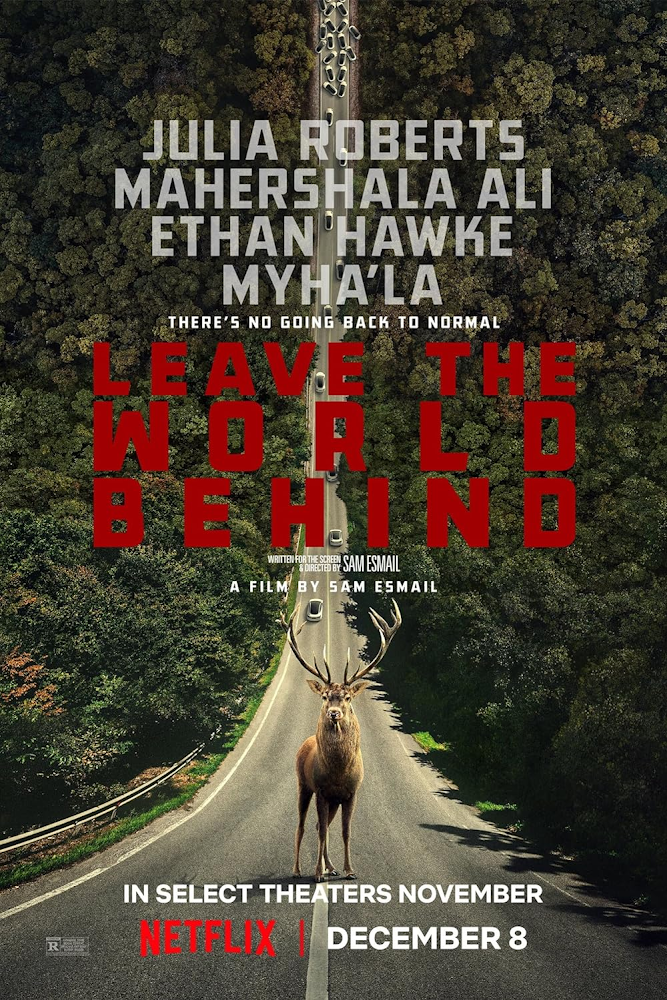The Sandford family is stuck in a rut. Married couple Amanda (Julia Roberts) and Clay (Ethan Hawke) have gotten lost in the monotony of work and childcare. Their children (Farrah Mackenzie, Charlie Evans), meanwhile, are tech-obsessed and unreachable. Naturally, a beachfront rental will solve all of their problems. Whisking her family away for a day was only meant to refresh their routines, but Amanda’s spontaneity ends up saving their lives.
When disaster sweeps through the city and the rental’s owners seek refuge in the countryside, Amanda leads with suspicion. At once, the Scotts: father and daughter duo George “G.H.” (Mahershala Ali) and Ruth (Myha’la Harrold) are made to feel like intruders in their own home. As they discover the true magnitude of the looming apocalypse, the two families are quickly forced to put their discomfort aside for the sake of survival.
“Leave the World Behind” was originally a novel written by Rumaan Alam, and was named a finalist for the 2020 National Book Award for Fiction. Sam Esmail has taken on the premise for its film adaptation, which is available to stream on Netflix. Though he rewrote the character of Ruth and took creative liberties with the film’s ending, Esmail’s work has largely stayed true to the original.
However, Esmail has done something few dare to. He has officially made a Julia Roberts character unlikeable, almost devastatingly so. Amanda is unapologetic, brazenly snide, and her villany represents the very worst of human nature during a disaster.
Besides the shock factor of Julia Roberts swearing within the first few minutes of his film, Esmail also believes in writing dialogue so dry that I almost wished another unexplained catastrophe on these poor people just as to fill the two hours of runtime. The first of these disasters, for example, involves an oil tanker headed straight for the beach where the Sandford family is sitting. Even after multiple dramatic shots of the incoming ship, the characters simply must share their genius insights into the situation. Their brilliance, such as, “Look at that boat. It’s so big,” was especially revealing. As the Sandford family continued to have an entire conversation about said boat, I only continued to slump further down into my seat. Thankfully, the cast remained engaged and emotional, even with such a lackluster script.
I feel about the same every time I watch a dystopian film, and I approached “Leave the World Behind” with a knowing reluctance. What good is dwelling on disaster if the film does not even suggest a solution, or at least suggest that one exists? In today’s age, I believe there is hardly room for more dystopian films that refuse to rise to it. Hopelessness is no fuel for a revolution, and dystopian media is no game-changer without a call for revolution. This movie certainly intellectualizes apocalyptic despair, but by pigeonholing itself into inaction, it destroys any chances it had at a definitive voice throughout.
“Leave the World Behind” is proudly advertised as a psychological thriller, and yet I spent most of the runtime feeling simply perturbed without any explanation, without any driving force. What this film delivers in casting, it lacks in scare factor. The inciting events of this apocalypse read as odd, but not much else. Beyond this, these catastrophes are hardly explained, mostly speculated about in an endless, frustrating circle of whodunnit. This manufactured uncertainty, although certainly an attempted foray towards individuality, fails to immerse the viewer emotionally in the story and instead keeps them at arms-length.
This film argues that as much as one may desire to leave their reality behind, there is no escape from our current era of disconnection. Both the Scotts and Sandfords want more from their lives than apathy and loneliness. As the two families wove, ever-so chaotically, in and out of trusting one another, I was, at times, reminded of “Lord of the Flies,” and that distrust is the seed that spawns destruction. Despite neglecting its genre, “Leave the World Behind” skillfully acknowledges the dystopia of the present, for in that lies the true horror.



























